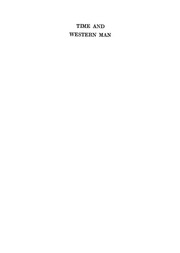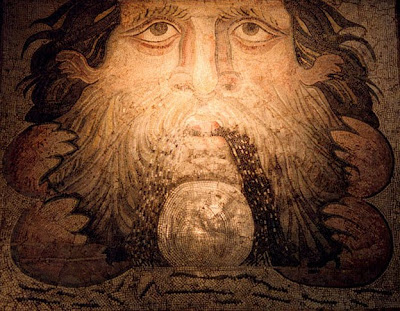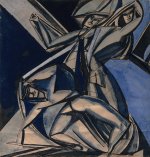You are using an out of date browser. It may not display this or other websites correctly.
You should upgrade or use an alternative browser.
You should upgrade or use an alternative browser.
Henri Bergson
- Thread starter DLaurent
- Start date
luka
Well-known member

Time And Western Man : Wyndham Lewis : Free Download, Borrow, and Streaming : Internet Archive
Book Source: Digital Library of India Item 2015.226089dc.contributor.author: Wyndham Lewisdc.date.accessioned: 2015-07-10T15:33:05Zdc.date.available:...
archive.org
THIS essay is the first part of a longer and more comprehensive study of the ‘time’-notions which have now, in one form or another, gained an
undisputed ascendancy in the intellectual world. In Book I, the time-
mind, as I have called it, is considered in its more concrete manifestations—as
we find it, notably, in works of fiction, poetry or painting. In Book II, the
significance of all that type of belief and feeling which can conveniently
be marshaled under the concept ‘Time’, is examined in detail. How the
‘timelessness’ of einsteinian physics, and the time-obsessed flux of Bergson,
merge in each other; and how they have conspired to produce, upon the
innocent plane of popularization, a sort of mystical time-cult, is shown
linebaugh
Well-known member
have you read Apes of God?
Time And Western Man : Wyndham Lewis : Free Download, Borrow, and Streaming : Internet Archive
Book Source: Digital Library of India Item 2015.226089dc.contributor.author: Wyndham Lewisdc.date.accessioned: 2015-07-10T15:33:05Zdc.date.available:...archive.org
THIS essay is the first part of a longer and more comprehensive study of the ‘time’-notions which have now, in one form or another, gained an
undisputed ascendancy in the intellectual world. In Book I, the time-
mind, as I have called it, is considered in its more concrete manifestations—as
we find it, notably, in works of fiction, poetry or painting. In Book II, the
significance of all that type of belief and feeling which can conveniently
be marshaled under the concept ‘Time’, is examined in detail. How the
‘timelessness’ of einsteinian physics, and the time-obsessed flux of Bergson,
merge in each other; and how they have conspired to produce, upon the
innocent plane of popularization, a sort of mystical time-cult, is shown
version
Well-known member
I've got that Bloomsbury volume of his 'key writings', but haven't read it yet. There's an excerpt from some book on D&G which mentions Bergsonian time which I like and have posted here before though,
The conventional, linear depiction of time — at least as old as Newton, with philosophical roots reaching as far back as Aristotle — presents it as a straight line in which each passing moment recedes behind the present, just as each approaching moment arrives from a future stretched out in front of us along the time-line we are travelling. It is surprising how pervasive and apparently convincing this depiction is at first blush — given that it is simply not true to our experience of time at all. For the past exists for us as a whole, not strung out along a line: to retrieve a past moment from six weeks ago, we don’t have to rewind the entire chain of events to get there: we jump immediately to the last days of summer. And we can jump from there to any other past moments, without having to trace out or locate those moments on any linear time-lines. The past is, if you will, omni-present to itself. At least that’s the way it seems to us. But then the question becomes: is this true only of our experience of the past? — or is it true of the past itself?
[…]
In other words, how do you get from phenomenology (or how things appear) to ontology and how things actually are? To be sure, past events co-exist in memory — we can scan the past and access this event or jump to that event, without having to replay the entire succession of moments between them. But how do we get from this psychological experience/recollection of the past to the notion that past events themselves co-exist ontologically? This is where Deleuze draws on Henri Bergson. The past for Bergson is not the repository of a linear series of passing presents, but an a-temporal bloc where each and every past event co-exists with all the others. For Bergson, it is not just in memory that one event can be connected with any other, irrespective of their respective places on a time-line: in the Bergsonian past, past events themselves co-exist, inhabiting a realm that Bergson calls the virtual: the past as a virtual whole […] (or as a bloc) is the condition for actual events to take place in the present, just as — for example — the language-system as a virtual whole (or what the structuralists call a structure, langue) is the condition for actual speech acts to take place in the present. This view of the past as a condition for the actualization of the present connects with the privileging of becoming over being that Deleuze adopts from Friedrich Nietzsche. Being is merely a momentary, subsidiary, and largely illusory suspension (or “contraction”) of becoming, according to this view; becoming is always primary and fundamental. This means not merely that each and every thing has a history — rather, each and every thing simply is its history: apparent being is always the temporary but actual culmination or expression of real becoming; it is the present actualization of antecedent conditions contained in the virtual past. In the terminology of A Thousand Plateaus, the process of actualization is called “stratification.”
-- Excerpt From: Eugene W. Holland. “Deleuze and Guattaris: A Thousand Plateaus.”
The conventional, linear depiction of time — at least as old as Newton, with philosophical roots reaching as far back as Aristotle — presents it as a straight line in which each passing moment recedes behind the present, just as each approaching moment arrives from a future stretched out in front of us along the time-line we are travelling. It is surprising how pervasive and apparently convincing this depiction is at first blush — given that it is simply not true to our experience of time at all. For the past exists for us as a whole, not strung out along a line: to retrieve a past moment from six weeks ago, we don’t have to rewind the entire chain of events to get there: we jump immediately to the last days of summer. And we can jump from there to any other past moments, without having to trace out or locate those moments on any linear time-lines. The past is, if you will, omni-present to itself. At least that’s the way it seems to us. But then the question becomes: is this true only of our experience of the past? — or is it true of the past itself?
[…]
In other words, how do you get from phenomenology (or how things appear) to ontology and how things actually are? To be sure, past events co-exist in memory — we can scan the past and access this event or jump to that event, without having to replay the entire succession of moments between them. But how do we get from this psychological experience/recollection of the past to the notion that past events themselves co-exist ontologically? This is where Deleuze draws on Henri Bergson. The past for Bergson is not the repository of a linear series of passing presents, but an a-temporal bloc where each and every past event co-exists with all the others. For Bergson, it is not just in memory that one event can be connected with any other, irrespective of their respective places on a time-line: in the Bergsonian past, past events themselves co-exist, inhabiting a realm that Bergson calls the virtual: the past as a virtual whole […] (or as a bloc) is the condition for actual events to take place in the present, just as — for example — the language-system as a virtual whole (or what the structuralists call a structure, langue) is the condition for actual speech acts to take place in the present. This view of the past as a condition for the actualization of the present connects with the privileging of becoming over being that Deleuze adopts from Friedrich Nietzsche. Being is merely a momentary, subsidiary, and largely illusory suspension (or “contraction”) of becoming, according to this view; becoming is always primary and fundamental. This means not merely that each and every thing has a history — rather, each and every thing simply is its history: apparent being is always the temporary but actual culmination or expression of real becoming; it is the present actualization of antecedent conditions contained in the virtual past. In the terminology of A Thousand Plateaus, the process of actualization is called “stratification.”
-- Excerpt From: Eugene W. Holland. “Deleuze and Guattaris: A Thousand Plateaus.”
luka
Well-known member
I picked up this very nice copy of it yesterday. Riso printed cover, nothing on the back. Very clean. I read the first page or so drunk at the taco bell and it was compelling
Groupname for Grapejuice
Beyond mere cynicism or satire, though, is Lewis' suggestion that there is a guided structure to the avant-garde arts. The Apes of God is the "story" of Horace Zagreus, a "bronzed albino" magician/artist/con man who with charisma and seduction utilizes young male, aspiring yet largely talentless artists to do his bidding. This involves the obscure manipulation and direction of the "Apes of God" -- the faux-artist denizens of the Bloomsbury bohemia -- and through them the general development of the arts.

Whether or not Lewis actually believed that this was occurring -- and there is good reason to think that he did -- it is pretty obvious that McLuhan was convinced of this. As Theall writes:
McLuhan's correspondence and his interpretation of Eric Voeglin demonstrate that he interpreted Lewis' "freemasonry of the arts" quite literally as being a direct allegorical symbol suggesting there were important social groups directly guided by magi, such as the contemporary magus, Aleister Crowley.
Theall suggests that Horace Zagreus is partly modeled on Aleister Crowley, and this is likely true. In The Apes of God many characters have obvious, though not exact, resemblances to actual figures that Lewis knew. The scribbler "Split Man," Julius Ratner, for instance, has undeniable similarities to Joyce. Lewis samples Ratner's writing as a parody of Joyce's style:
Let's be pals Alec, he had wanted to say, taking him by the arm and leading him to the embrasure of the window, from which could be seen the boa-constrictor of the black river. Let's be real pals. A factory. Two freemasons. A cloud threatened the tail of the serpent. A little child picked a forget-me-not. She lifted a chalice. It was there. Epiphany. There were three distinct vibrations.
A clearer match to Zagreus, though, and a person who was much closer to Lewis than Crowley, is Ezra Pound. Pound, like Zagreus, was a charming bigger-than-life eccentric in bohemian circles whose tireless literary and editorial efforts made him an extremely connected and influential figure. Like Zagreus, Pound also sought out and mentored younger literary apprentices. One such "disciple" was Ernest Hemingway, who writes of Pound's significant influence on him as a writer in Hemingway's own memoir of his bohemian days in Paris, A Moveable Feast.
"To tell you the truth, Hem," Ezra said, "I've never read the Rooshians."
It was a straight answer and Ezra had never given me any other kind verbally, but I felt very bad because here was the man I liked and trusted the most as a critic then, the man who believed in the mot juste - the one and only correct word to use - the man who had taught me to distrust adjectives as I would later learn to distrust certain people in certain situations; and I wanted his opinion on a man who almost never used the mot juste and yet had made his people come alive at times, as almost no one else did.
"Keep to the French," Ezra said. "You've plenty to learn there."
"I know it," I said. "I've plenty to learn everywhere."
It is extremely doubtful that Hemingway had even a bit of the fawning dependence on Pound that Zagreus inspired and expected of his young acolytes in The Apes of God, but it could be that this, although exaggerated in his novel, was how this relationship between writers appeared to Lewis.

A deeper connection of Ezra Pound to Horace Zagreus, however, gets to the very heart of the weirdness and goes some of the way to explain why "the freemasonry of the arts" is in fact a form of Freemasonry.
In Pound's 1922 calendar of the new era, published anonymously in The Little Review literary magazine, "Horus" and "Zagreus" are featured prominently. In the calendar, the year was said to have turned upon Horus, and Zagreus -- the form of the god Dionysus worshiped in the Eleusinian Mysteries -- is also the name of the Feast at the end of the calendar year, October 30th, which is also Pound's birthday. Zagreus is Pound and Pound is Zagreus.
Lewis may have known of the importance Pound placed in these gods -- as Crowley did also -- and there is a good chance that he was also aware of the utmost reverence and aspiration Pound had for a renewed Eleusis. And the link between Lewis' own work and Eleusis may be stronger still.
luka
Well-known member
i guess we could just read this

 en.wikipedia.org
en.wikipedia.org

Henri Bergson - Wikipedia
version
Well-known member
SEP would probably be better than Wikipedia, if you're not going to read the books.
Henri Bergson (Stanford Encyclopedia of Philosophy)
plato.stanford.edu
luka
Well-known member
It has been alleged that Bergson's knowledge of physics was insufficient and that the book did not follow up contemporary developments on physics. On the contrary, in "Einstein and the Crisis of Reason", a leading French philosopher, Maurice Merleau-Ponty, accused Einstein of failing to grasp Bergson's argument. This argument, Merleau-Ponty says, which concerns not the physics of special relativity but its philosophical foundations, addresses paradoxes caused by popular interpretations and misconceptions about the theory, including Einstein's own
this chimes with my sense of science being basically bad philosophy.
this chimes with my sense of science being basically bad philosophy.

